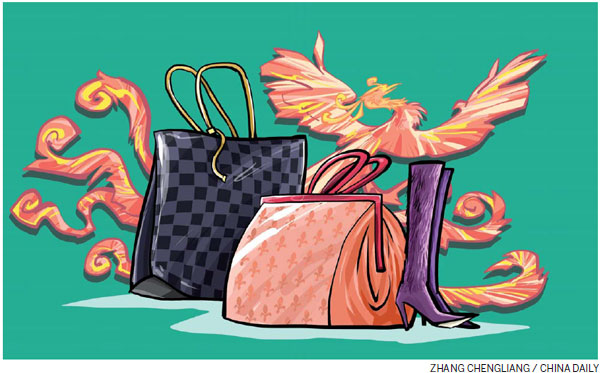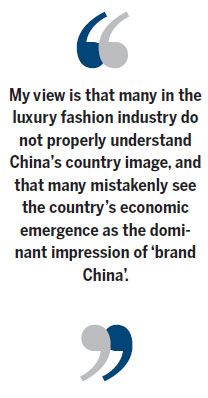Brands should tap into Chinese heritage
Updated: 2015-12-18 09:19
By Mike Bastin(China Daily Europe)
|
|||||||||||
Luxury goods producers would do well to link themselves to positive associations of country's culture
With the Christmas season now in full swing across Europe and many other parts of the world, it is no surprise to see the usual luxury fashion brands competing through emotive and expensive television advertisements.
British clothing retailer John Lewis has typically led the way, with this year's Christmas ad costing 1 million pounds ($1.52 million; 1.38 million euros) to produce, with a further 6 million pounds in rollout costs.

But perhaps most significant is the association with national image that many of today's luxury fashion brands continue to employ.
Burberry is a prime example; Britishness and English heritage take center stage in all aspects of its emotional brand management. Hence, this year, its Christmas ad features Romeo Beckham, second son of former England soccer captain David, and Elton John, as well as other British national treasures.
In France, companies such as Louis Vuitton, Chanel and Christian Dior have also made national image a key part of brand building, and so too have Italy's Gucci and Armani.
On close inspection, however, it is not just country image that lies at the heart of many of the most successful luxury fashion brands, but rather history and heritage that date back centuries. Burberry, for example, plays on traditional British values like decency, honesty and integrity.

Luxury fashion consumers' appreciation in this area and the desire to experience nostalgia is, of course, the real driving force here. Research continues to highlight the fact such brands satisfy the need for nostalgia.
So why is it that China, the country with probably the longest history and possibly the richest cultural heritage, still has not produced a genuinely global luxury fashion brand? And why have no non-Chinese luxury fashion brands even attempted to infuse their brand with Chinese heritage associations?
My view is that many in the luxury fashion industry do not properly understand China's country image, and that many mistakenly see the country's economic emergence as the dominant impression of "brand China".
Modern China, and in particular the rise of its economy, is often front-page news. But this has led to an image centered on low-cost production, environmental degradation, and air and water pollution, which have always been considered the necessary evils associated with breakneck economic growth.
Sadly, this has led to the widespread belief that China's thousands of years of history and rich cultural heritage no longer enjoy top-of-mind awareness when its country image is considered.
My current research focuses on uncovering exactly what image Western consumers have in mind when asked about China, its history in particular. Strength of feeling and association are also measured.
Early focus group discussions revealed that modern China and rapid economic growth dominate the mindset. However, when a revised set of discussion topics were produced, focusing exclusively on ancient China - back as far as the first emperor and up to the last days of Pu Yi, the last emperor of the Qing Dynasty (1644-1911) - a very different debate and atmosphere emerged.
Right from the start a tangible excitement and even passion could be detected in a focus group discussion on China's history and cultural riches, from literature to music and painting. Not only did it quickly become clear that knowledge levels are high, but extremely positive adjectives began to flow such as "magnificent" (about the Great Wall), "highbrow and sophisticated" (poetry), and "immaculate and intricate" (ancient Suzhou embroidery).
Also noteworthy was the clear distinction made between modern-day China and ancient China. Certainly, it appears that the associations with low-cost production and with pollution evoked when modern China is considered do not affect in any way the rich and emotionally positive feelings associated with ancient China.

Crucially, these focus group discussions ended with some sort of comparison of Chinese cultural heritage, and the beliefs and feelings held about the United Kingdom, France and Italy. Those who participated (even the few French and Italian consumers) appeared significantly more favorably disposed toward aspects of Chinese history that resonated most in their minds. Research papers will be published before too long, but for now the findings point toward the cultures of the Han, Song and Tang dynasties that lie deepest in the memory.
Further focus groups have also been conducted with Chinese luxury fashion consumers to gauge what, if any, feelings and associations they may have with ancient China. Not surprisingly, very strong and extremely positive feelings were discussed.
But perhaps what was surprising was the discussion that took place when Chinese consumers were asked to compare Chinese heritage with British, French and Italian heritage. Chinese consumers account for about half of all sales of luxury products worldwide, and yet our discussion revealed that Chinese heritage compares favorably with the images of the UK, France and Italy. It would appear that even modern-day Chinese consumers hold in high esteem their country's rich and vast cultural heritage.
So what now for the use of Chinese heritage in luxury fashion brand building?
The next step for my research is the completion of a lengthy questionnaire that seeks to capture more data from Western and Chinese consumers. However, the findings from the qualitative research already present a compelling case for far greater use of Chinese heritage associations in luxury fashion brand building. It is important to note that this opportunity does not just apply to Chinese industry, but companies globally.
But what explanation could there possibly be for these early findings and the inherent advantage that Chinese heritage appears to enjoy compared with France and Italy?
It is my belief that Chinese philosophers can help us to understand these findings more. In short, unlike Western philosophy, Chinese history and philosophy writings are characterized most by humanism, an approach and output driven by the inner belief that human, rather than divine or supernatural matters, are of prime importance.
Luxury fashion brands, if not all successful brands, manage to establish some sort of personification in the mind of the consumer. It is therefore the unique dominance of humanism throughout Chinese history that perhaps presents a golden opportunity for luxury fashion brand building via Chinese heritage associations.
The author is a visiting professor at the University of International Business and Economics in Beijing and a senior lecturer on marketing at Southampton Solent University's School of Business. The views do not necessarily reflect those of China Daily.
(China Daily European Weekly 12/18/2015 page13)
Today's Top News
Xi calls for shared future in cyberspace
China successfully launches its first dark matter satellite
China becomes shareholder in European bank
Jeb Bush calls Trump a 'chaos candidate'
French report stresses China's growth offers new opportunities
Reasonable economomic growth rate targeted
French far-right fails to win any regions
Obama says anti-IS fight continues to be difficult
Hot Topics
Lunar probe , China growth forecasts, Emission rules get tougher, China seen through 'colored lens', International board,
Editor's Picks

|

|

|

|

|

|






